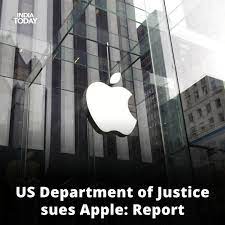In a significant development that could reshape the landscape of the smartphone industry, the United States Department of Justice has filed an expansive antitrust lawsuit against Apple Inc., accusing the tech giant of operating an illegal monopoly in the smartphone market. Joined by 16 state and district attorneys general, the DOJ alleges that Apple’s business practices have led to higher prices for consumers and developers while stifling competition and innovation.
At the heart of the lawsuit is the contention that Apple has used its dominance in the smartphone market to impose restrictive contractual agreements and withhold critical access points, thereby preventing competitors from emerging and locking users into its ecosystem. The government argues that these actions have enabled Apple to extract more money from consumers, developers, content creators, and businesses, ultimately harming competition and consumer choice.
The lawsuit points to several specific allegations against Apple:
- Disruption of “super apps” and cloud-streaming services: The DOJ alleges that Apple has hindered the development of “super apps” that offer a range of services within a single platform, as well as cloud-streaming apps for video games. By limiting these offerings, Apple aims to maintain its grip on users and discourage them from switching to competing devices.
- Suppression of messaging and interoperability: Apple is accused of limiting the functionality of messaging between iPhones and competing platforms like Android, as well as making it harder for users to switch from iPhones to other devices due to compatibility issues with third-party smartwatches and digital wallets.
- Use of restrictive contractual rules: The government asserts that Apple has employed a strategy of imposing stringent contractual rules and restrictions on developers and creators, allowing the company to extract higher prices and stifle competitive alternatives.
DOJ Antitrust Division Chief Jonathan Kanter described Apple’s response to competitive threats as a game of “Whac-A-Mole,” wherein the company has employed a series of contractual rules and restrictions to maintain its dominance in the market. The lawsuit, filed in the US District Court for the District of New Jersey, seeks to prevent Apple from further using its control of app distribution to undermine cross-platform technologies and maintain its monopoly.
The case represents a significant escalation in the ongoing battle between tech giants and government regulators over antitrust concerns. With attorneys general from multiple states joining the complaint, the lawsuit underscores the broad bipartisan support for challenging Apple’s market practices and promoting competition in the smartphone industry.
As the legal proceedings unfold, the outcome of the case will have far-reaching implications for Apple, consumers, developers, and the broader technology sector. It remains to be seen how Apple will respond to the allegations and whether the lawsuit will result in changes to the company’s business practices. In the meantime, the antitrust battle between the United States and Apple is poised to continue, shaping the future of competition in the digital economy.
